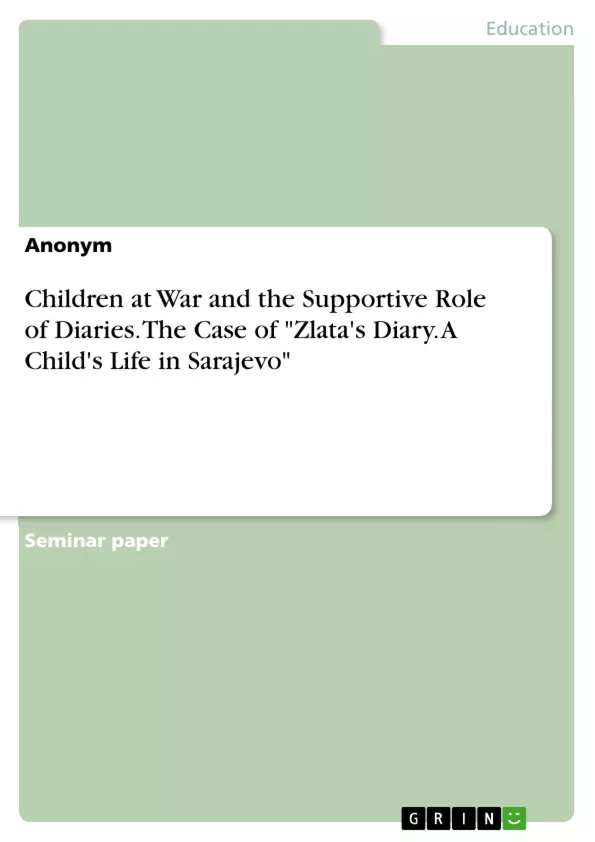This essay examines the important supportive role diaries can play for children in coping with war and experiencing war at first hand. In particular, it is concerned with the diary of Zlata Flipovic's autobiographic work "Zlata's Diary. A Child's Life in Sarajevo" and the Yugoslav Wars".
Therefore, the author begins by giving background information on the Yugoslav Wars and a short general introduction to the diary itself, before describing the diary and it's content more extensively. Here, the authors puts special emphasis on the potential therapeutic effects of journal writing, especially when suffering under PTSD. In a third step, she further examines the specific techniques of writing within the context of the diary.
Finally, a short conclusion based on the aforementioned facts is drawn.
Table of Contents
- Introduction
- The Yugoslavia War
- Zlata's Diary
- How the war stole her childhood
- Zlata and PTSD
- The Journal Therapy
- Diary Writing and its Versatility
- The Techniques of Writing
- War Diaries
- Conclusion
- References
Objectives and Key Themes
This term paper explores the impact of war on children, focusing on the supportive role of diary writing. It investigates whether diary writing can help young people cope with traumatic events, particularly war. The paper utilizes the book "Zlata's Diary" by Zlata Filipovic, which chronicles the experiences of a young girl living through the war in Sarajevo, as a primary source.
- The impact of war on children
- Diary writing as a therapeutic tool for coping with trauma
- The effectiveness of diary writing in processing war experiences
- The use of diary writing as a tool for understanding the human experience of war
- The significance of publishing war diaries
Chapter Summaries
- Introduction: The introduction sets the stage for the term paper by highlighting the pervasive nature of war throughout history, particularly focusing on its devastating effects on children. It introduces Zlata's Diary as a case study and emphasizes the role of diary writing as a potential coping mechanism for young people during war.
- The Yugoslavia War: This chapter provides historical context by outlining the complex factors that led to the Yugoslavia War in the 20th century. It explores the political and economic tensions that fuelled the conflict, specifically highlighting the motivations behind the independence movements of Slovenia and Croatia.
- Zlata's Diary: This chapter introduces Zlata Filipovic and her diary as a personal account of life in war-torn Sarajevo. The author presents Zlata's pre-war life, highlighting the stark contrast with the experiences she faces during the war.
- How the war stole her childhood: This section delves into the devastating impact of war on Zlata's life. It discusses how her childhood innocence is shattered by the violence and how she copes with the loss of friends and the constant fear of shelling.
Keywords
This paper focuses on the key themes of war, childhood, trauma, diary writing, therapy, coping mechanisms, Zlata's Diary, and the Yugoslavia War.
Frequently Asked Questions
What is "Zlata's Diary" about?
It is an autobiographical work by Zlata Filipovic, documenting her life as a young girl in Sarajevo during the Yugoslav Wars between 1991 and 1993. It captures how war destroyed her childhood innocence.
Can diary writing help children cope with war trauma?
Yes, research suggests that journal writing can have therapeutic effects, helping children process traumatic events and manage symptoms of Post-Traumatic Stress Disorder (PTSD).
What were the causes of the Yugoslav Wars mentioned in the text?
The conflict was fueled by complex political and economic tensions, leading to independence movements in Slovenia and Croatia, which eventually escalated into a full-scale war affecting Bosnia and Sarajevo.
How does Zlata describe her life before and during the war?
Before the war, her life was typical of a young student focused on music and friends. During the war, her entries shift to fear of shelling, the loss of loved ones, and the struggle for basic survival.
What are some techniques of journal therapy?
Techniques include free writing, expressive writing, and using the diary as a "confidante" to externalize emotions that are too difficult to speak aloud during times of crisis.
- Citation du texte
- Anonym (Auteur), 2014, Children at War and the Supportive Role of Diaries. The Case of "Zlata's Diary. A Child's Life in Sarajevo", Munich, GRIN Verlag, https://www.grin.com/document/498107



